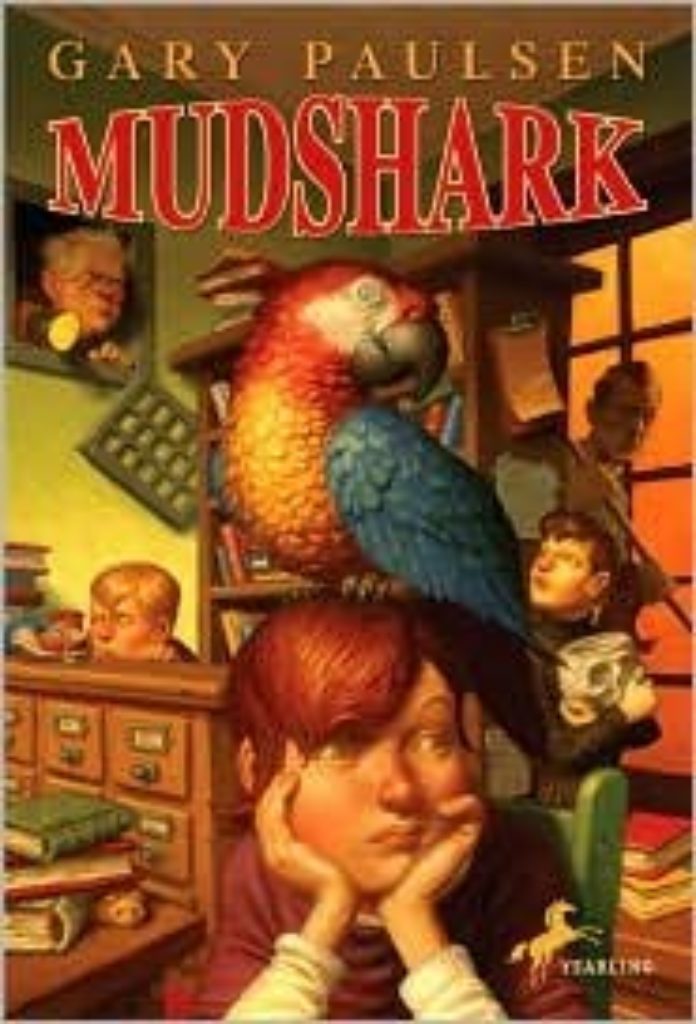Mudshark by Gary Paulsen has been reviewed by Focus on the Family’s marriage and parenting magazine.

Mudshark by Gary Paulsen has been reviewed by Focus on the Family’s marriage and parenting magazine.
Twelve-year-old Lyle Williams plays Death Ball — a combination of soccer, football, wrestling, rugby and mud fighting. When he trips and lands flat on his back, a member of the opposing team runs by him with the ball. Lyle stretches out his arm, grabs the player and prevents him from scoring. Later, Billy Crisper, an avid viewer of the animal channel, says that Lyle moved as fast as a mud shark. From that point forward, Lyle Williams is called by the nickname Mudshark.
Mudshark is such a keen observer that kids who have lost something come to him for help. When Kyle Robertson magically makes his father’s car disappear, Mudshark finds it. When Willamena Carson loses the plastic brain that fits inside her model skull, Mudshark uncovers it. When Ms. Underdorf, the school librarian, buys an armadillo that never eats or moves, Mudshark realizes that it is actually a purse. Ms. Underdorf then buys a new pet — a squawky bird that has an uncanny ability to retrieve lost items, much like Mudshark.
When the principal asks for Mudshark’s help in recovering all of the school’s missing erasers, Mudshark recruits his friends, the librarian and the custodian to help him dupe the chatty bird, find the erasers and protect the culprit’s identity.
Willamena Carson loses her plastic brain model in the front pew of a Methodist church during a weekend sleepover.
Other students think Mudshark has a sixth sense because of his sharp memory. Kids and faculty members also believe the parrot is psychic because it can find lost items without leaving his perch. Mudshark later discovers that the bird often escapes from his cage, wanders around the school and notices the same details as Mudshark.
Nearly every chapter opens with an announcement from the school principal regarding three things: the hazardous smell coming from the faculty restroom, the increasing amount of missing erasers and a lost gerbil. The principal also feels it is his responsibility to get out of the way of teachers so they can teach. The narrator comments that the school secretary actually runs the school. Ms. Underdorf is happy that more kids are populating the library, even though they are only there to ask the parrot questions because they think it’s psychic. When Kyle Robertson makes his father’s car disappear, his dad tells him that if he ever does it again, Kyle won’t be able to sit down for three months. Mudshark often looks after his three sisters because his parents are too busy or aren’t paying attention. Mr. Patterson gets lost inside the school’s air ducts at the end of the story.
Death Ball is a popular game among kids but has been banned from school grounds because of the health risks that may result from ingesting mud. Mudshark’s little sisters have a food fight at dinner. Mr. Patterson, who is startled by the lost gerbil, goes around school swinging a tennis racket at anything that moves, leaving waffle marks on the faces of several students. Mudshark considers releasing a Tasmanian devil in the library to get rid of the parrot.
Due to a lack of erasers, some teachers wipe the blackboards with their shirttails, creating uncomfortable moments in a classroom when the teacher is not fully clothed.
Get free discussion questions for this book and others, at FocusOnTheFamily.com/discuss-books.
Faculty and staff ask the parrot for winning lottery numbers because they think the parrot is psychic.
You can request a review of a title you can’t find at reviewrequests@family.org.
Book reviews cover the content, themes and worldviews of fiction books, not their literary merit, and equip parents to decide whether a book is appropriate for their children. The inclusion of a book’s review does not constitute an endorsement by Focus on the Family.